英语沙龙活动记录表
小学英语兴趣小组活动记录

活动
效果
利用动画呈现故事,卡通形象风趣幽默,在学习故事的同时,学生感想颇多,效果较好。
英语兴趣小组活动记录表
周次
十二
活动时间
课外活动
活动地点
德育室
活动人数
20
辅导教师
活动内容
学习与水果相关的单词
活
动
过
程
记Байду номын сангаас
录
1.新课展示
老师利用卡片或实物引入生词。如:Look! I have a peach. It’s pink.学生跟读注意教划线字母的发音。Peach, orange。
英语兴趣小组活动记录表
周次
十一
活动时间
课外活动
活动地点
德育室
活动人数
20
辅导教师
活动内容
学习故事《熊与狐狸》
活
动
过
程
记
录
一.复习动物类单词
你学过什么动物类单词呢
二.故事导入
今天,一只熊遇见了一只狐狸,发生了什么事呢
三.学习故事
A bear used to boast of his excessive love for that he never worried or mauled him when dead .the fox observed .with a smile :I should have thought more of profession if you never eaat him alive .
三、 学习表达I like…来表达自己的喜好。
四、 设置情境,编短剧来进行交际。
活动
效果
学生能够表达句型,会读单词。
英语社团活动记录
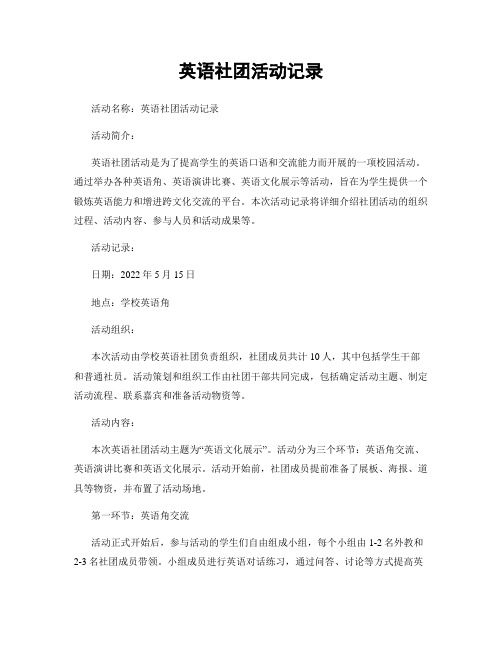
英语社团活动记录活动名称:英语社团活动记录活动简介:英语社团活动是为了提高学生的英语口语和交流能力而开展的一项校园活动。
通过举办各种英语角、英语演讲比赛、英语文化展示等活动,旨在为学生提供一个锻炼英语能力和增进跨文化交流的平台。
本次活动记录将详细介绍社团活动的组织过程、活动内容、参与人员和活动成果等。
活动记录:日期:2022年5月15日地点:学校英语角活动组织:本次活动由学校英语社团负责组织,社团成员共计10人,其中包括学生干部和普通社员。
活动策划和组织工作由社团干部共同完成,包括确定活动主题、制定活动流程、联系嘉宾和准备活动物资等。
活动内容:本次英语社团活动主题为“英语文化展示”。
活动分为三个环节:英语角交流、英语演讲比赛和英语文化展示。
活动开始前,社团成员提前准备了展板、海报、道具等物资,并布置了活动场地。
第一环节:英语角交流活动正式开始后,参与活动的学生们自由组成小组,每个小组由1-2名外教和2-3名社团成员带领。
小组成员进行英语对话练习,通过问答、讨论等方式提高英语口语表达能力。
同时,社团成员还提供了一些英语学习资料和游戏,增加了活动的趣味性和互动性。
第二环节:英语演讲比赛英语演讲比赛是本次活动的重头戏。
参赛选手事先准备了自己感兴趣的英语演讲主题,并在比赛中展示自己的英语口语和演讲能力。
评委由学校英语教师和外籍教师组成,根据演讲内容、语言表达、演讲技巧等方面进行评分。
比赛过程中,观众们积极参与,为选手们加油鼓劲。
第三环节:英语文化展示英语文化展示环节是为了增进学生对英语国家文化的了解。
社团成员准备了英语国家的风俗习惯、传统节日、名胜古迹等相关展板和资料,并邀请了一位英语国家的留学生作为嘉宾,向学生们介绍了自己的国家文化和生活习惯。
学生们通过观看展板、与嘉宾交流等方式,深入了解了英语国家的文化。
活动成果:本次英语社团活动取得了丰硕的成果。
通过活动,学生们积极参与英语交流,提高了英语口语表达能力和自信心。
英语教研活动记录单
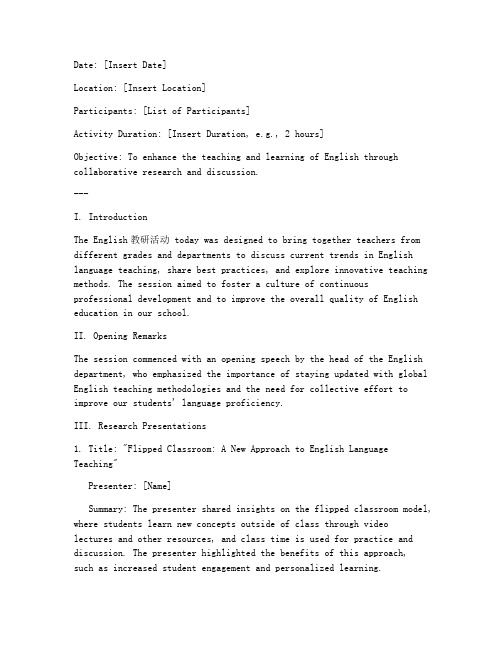
Date: [Insert Date]Location: [Insert Location]Participants: [List of Participants]Activity Duration: [Insert Duration, e.g., 2 hours]Objective: To enhance the teaching and learning of English through collaborative research and discussion.---I. IntroductionThe English教研活动 today was designed to bring together teachers from different grades and departments to discuss current trends in English language teaching, share best practices, and explore innovative teaching methods. The session aimed to foster a culture of continuousprofessional development and to improve the overall quality of English education in our school.II. Opening RemarksThe session commenced with an opening speech by the head of the English department, who emphasized the importance of staying updated with global English teaching methodologies and the need for collective effort to improve our students' language proficiency.III. Research Presentations1. Title: "Flipped Classroom: A New Approach to English Language Teaching"Presenter: [Name]Summary: The presenter shared insights on the flipped classroom model, where students learn new concepts outside of class through videolectures and other resources, and class time is used for practice and discussion. The presenter highlighted the benefits of this approach,such as increased student engagement and personalized learning.2. Title: "Using Technology in English Language Teaching"Presenter: [Name]Summary: This presentation focused on the use of technology in English teaching, including apps, online platforms, and interactive software. The presenter demonstrated how these tools can be effectively integrated into lesson plans to enhance student learning and motivation.3. Title: "The Role of English in Globalization"Presenter: [Name]Summary: The presenter discussed the importance of English in the context of globalization, emphasizing the need for students to be proficient in English to succeed in the global workforce. The presentation included examples of how English proficiency can open doors to international opportunities.IV. Group DiscussionsFollowing the presentations, participants were divided into small groups to discuss the following topics:1. Group 1:- Topic: Implementing the Flipped Classroom Model- Discussion Points: Challenges, resources required, and potential benefits for our school.2. Group 2:- Topic: Effective Use of Technology in English Lessons- Discussion Points: Best practices, student engagement, and integration of technology into existing curricula.3. Group 3:- Topic: Preparing Students for the Global Workplace- Discussion Points: Strategies for improving English proficiency, cultural awareness, and global citizenship.V. Feedback and RecommendationsEach group presented their findings and recommendations to the larger group. Key points from the discussions included:- Flipped Classroom: Teachers should pilot the flipped classroom approach in select classes to gather feedback and make necessary adjustments before a full-scale implementation.- Technology: Continuous professional development for teachers is essential to stay abreast of new technologies and effectively integrate them into teaching.- Global Readiness: Collaboration with other departments and stakeholders is crucial to develop a comprehensive program that prepares students for the global workforce.VI. Wrap-up and Next StepsThe head of the English department summarized the day's activities and emphasized the importance of collaboration and continuous improvement. The following steps were outlined for the next phase of the project:1. Pilot Programs: Begin pilot programs for the flipped classroom and technology integration in select classes.2. Training Workshops: Organize training workshops for teachers to enhance their skills in using technology and flipped classroom methods.3. Curriculum Development: Collaborate with other departments to developa curriculum that emphasizes global readiness.VII. Participant FeedbackParticipants were asked to fill out a feedback form at the end of the session. The feedback was overwhelmingly positive, with many expressing a desire to continue such collaborative activities in the future.---End of Record SheetThis English教研活动 record sheet serves as a comprehensive document of the session's objectives, activities, and outcomes. It will be used to monitor progress and ensure the successful implementation of the discussed initiatives.。
英语教研沙龙活动记录(3篇)
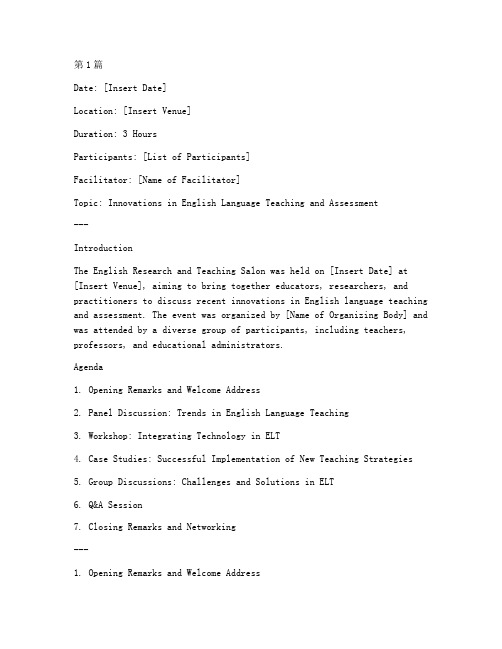
第1篇Date: [Insert Date]Location: [Insert Venue]Duration: 3 HoursParticipants: [List of Participants]Facilitator: [Name of Facilitator]Topic: Innovations in English Language Teaching and Assessment---IntroductionThe English Research and Teaching Salon was held on [Insert Date] at [Insert Venue], aiming to bring together educators, researchers, and practitioners to discuss recent innovations in English language teaching and assessment. The event was organized by [Name of Organizing Body] and was attended by a diverse group of participants, including teachers, professors, and educational administrators.Agenda1. Opening Remarks and Welcome Address2. Panel Discussion: Trends in English Language Teaching3. Workshop: Integrating Technology in ELT4. Case Studies: Successful Implementation of New Teaching Strategies5. Group Discussions: Challenges and Solutions in ELT6. Q&A Session7. Closing Remarks and Networking---1. Opening Remarks and Welcome AddressThe event commenced with the opening remarks by the facilitator, [Name of Facilitator], who emphasized the importance of continuous professional development in the field of English language teaching. He highlighted the objectives of the salon and expressed his anticipation for meaningful discussions and knowledge exchange among the participants.2. Panel Discussion: Trends in English Language TeachingThe panel discussion was moderated by [Name of Moderator] and featured experts in the field of English language teaching. The panelists discussed several key trends, including:- Flipped Classroom: This approach allows students to learn new content at home and engage in more interactive activities in the classroom, promoting deeper learning and critical thinking skills.- Blended Learning: Combining traditional face-to-face instruction with online resources and activities can provide a more personalized learning experience for students.- Gamification: Incorporating game-like elements into ELT can increase motivation and engagement among students.- Project-Based Learning: This method encourages students to apply their knowledge to real-world problems, fostering collaboration and problem-solving skills.3. Workshop: Integrating Technology in ELTThe workshop, led by [Name of Workshop Leader], focused on practical ways to integrate technology into English language teaching.Participants were introduced to various digital tools and platforms, such as:- Interactive Whiteboards: These tools facilitate dynamic and engaging lessons, allowing teachers to present information and interact with students simultaneously.- Online Learning Management Systems (LMS): LMS platforms, such as Moodle and Blackboard, can be used to organize course materials, communicate with students, and track their progress.- Educational Apps: Apps like Duolingo and Rosetta Stone offer interactive language learning experiences that can supplement classroom instruction.4. Case Studies: Successful Implementation of New Teaching StrategiesSeveral case studies were presented by participants, showcasing the successful implementation of new teaching strategies in their respective classrooms. These included:- A teacher from [Name of School] shared her experience of usingproject-based learning to teach grammar. Students worked in groups to create presentations on various grammatical structures, which they then presented to their classmates. This approach not only improved students' understanding of grammar but also enhanced their public speaking skills.- Another teacher from [Name of School] discussed the use ofgamification to increase student engagement. By incorporating game-like elements into her lessons, she was able to create a more interactive and enjoyable learning environment.5. Group Discussions: Challenges and Solutions in ELTParticipants were divided into small groups to discuss challenges they face in English language teaching and to brainstorm potential solutions. Some of the challenges identified included:- Diverse Learning Styles: Students have different learning styles, which can make it difficult for teachers to cater to all needs.- Limited Resources: Many schools lack the necessary resources to implement innovative teaching methods.- Assessment: Finding effective and fair ways to assess student learning remains a challenge for many teachers.The groups generated several solutions, such as:- Differentiated Instruction: Tailoring instruction to meet the individual needs of students.- Collaboration with Other Teachers: Sharing resources and best practices with colleagues.- Professional Development: Investing in ongoing training and development for teachers.6. Q&A SessionThe Q&A session provided an opportunity for participants to ask questions and seek clarification on the topics discussed during the salon. Several questions were raised regarding the implementation of flipped classrooms, the use of technology in ELT, and the effectiveness of project-based learning.7. Closing Remarks and NetworkingThe event concluded with closing remarks from the facilitator, who thanked the participants for their contributions and emphasized the importance of collaboration and continuous learning in the field of English language teaching. Participants were encouraged to continue the discussions and share their experiences with their colleagues.ConclusionThe English Research and Teaching Salon was a successful event that provided a platform for educators to discuss recent innovations in ELT and share their experiences and insights. The event not only enhanced the participants' understanding of current trends but also equipped them with practical tools and strategies to improve their teaching practices. As the field of English language teaching continues to evolve, events like this salon are essential for fostering collaboration and promoting professional growth among educators.第2篇Date: March 15, 2023Location: Online Platform (Zoom)Duration: 3 hoursAttendees: 25 English language educators and researchersFacilitator: Dr. Emily Thompson---IntroductionThe English Research and Education Salon was held on March 15, 2023, bringing together a diverse group of English language educators and researchers. The event aimed to foster a collaborative environment where professionals could share their insights, discuss current trends in English language teaching and research, and explore innovativestrategies for enhancing language learning outcomes.Agenda1. Opening Remarks and Welcome2. Keynote Speech: "The Future of English Language Teaching"3. Panel Discussion: "Challenges and Opportunities in Online English Language Learning"4. Workshops: "Innovative Techniques for Language Acquisition"5. Roundtable: "Teacher Development and Professional Growth"6. Networking and Coffee Break7. Closing Remarks---1. Opening Remarks and WelcomeDr. Emily Thompson, the facilitator of the event, welcomed the attendees and expressed her excitement about the opportunity to engage in meaningful discussions. She emphasized the importance of continuous professional development for English language educators and the value of such gatherings in fostering a sense of community among colleagues.2. Keynote Speech: "The Future of English Language Teaching"Dr. Thompson delivered a captivating keynote speech that explored the future of English language teaching. She highlighted the increasing role of technology in language learning, the importance of personalized learning experiences, and the need for educators to adapt to the changing demands of the globalized world. The speech was well-received, with many attendees appreciating the visionary insights provided by Dr. Thompson.3. Panel Discussion: "Challenges and Opportunities in Online English Language Learning"A panel of three experts in online language learning discussed the challenges and opportunities associated with this rapidly growing field. The panelists shared their experiences and strategies for effectively teaching English online, including the use of virtual reality, gamification, and social media. The discussion was lively, with attendees contributing their own perspectives and experiences.4. Workshops: "Innovative Techniques for Language Acquisition"Four workshops were held throughout the day, each focusing on adifferent innovative technique for language acquisition. The workshops covered a wide range of topics, including:- Flipped Classroom Approach: How to use technology to create engaging pre-class activities and maximize classroom time for interactive learning.- Project-Based Learning: Strategies for incorporating project-based learning into English language courses to enhance critical thinking and collaboration skills.- Language Learning through Literature: How to use literature to develop language skills and cultural awareness.- Cultural Exchange Programs: The benefits of international exchange programs for both students and educators.Attendees actively participated in the workshops, sharing their own experiences and ideas, and leaving with practical tools and resources to implement in their classrooms.5. Roundtable: "Teacher Development and Professional Growth"A roundtable discussion was held to explore the importance of teacher development and professional growth in the field of English language education. Attendees discussed the challenges they face in their professional lives, the support systems they rely on, and the importance of ongoing training and mentorship. The discussion was insightful, with many attendees finding it beneficial to hear about the experiences of their peers.6. Networking and Coffee BreakAttendees had the opportunity to network with their colleagues during a coffee break. This provided a relaxed atmosphere for informal discussions and the exchange of contact information. Many attendees expressed their appreciation for the networking opportunities provided by the salon.7. Closing RemarksDr. Thompson concluded the event with a summary of the key points discussed throughout the day. She thanked the attendees for their participation and encouraged them to continue the discussions and collaborations that had begun at the salon. She also reminded everyone of the importance of staying informed about the latest developments in English language education and research.---ReflectionsThe English Research and Education Salon was a resounding success, providing a valuable opportunity for English language educators and researchers to connect, learn, and grow. The diverse range of topics covered, the engaging workshops, and the insightful discussions leftattendees feeling inspired and motivated to bring new ideas and strategies back to their classrooms.As the field of English language education continues to evolve, events like the English Research and Education Salon are crucial for keeping educators informed and connected. The collaborative spirit and shared commitment to excellence in language teaching that were evident throughout the day are sure to lead to positive outcomes for students and professionals alike.第3篇Date: March 15, 2023Location: Online Conference PlatformDuration: 2 hoursParticipants: 20 English teachers from various primary and secondary schoolsI. IntroductionThe English Research and Teaching Salon was organized by the School of Foreign Languages to provide a platform for English teachers to share their experiences, discuss teaching strategies, and explore innovative approaches to language education. The event was attended by 20 English teachers from different primary and secondary schools in our city.II. Opening RemarksThe session began with a warm welcome from the chairperson, Ms. Liu, who emphasized the importance of continuous professional development for English teachers. She highlighted the objectives of the salon, which included:1. Enhancing teaching skills and methodologies.2. Promoting collaboration and networking among teachers.3. Sharing best practices and innovative teaching ideas.III. Presentation: Technology in English Language TeachingThe first presentation was given by Mr. Wang, a technology enthusiast and English teacher from High School A. His talk, titled "Technology in English Language Teaching: Enhancing Engagement and Learning Outcomes," focused on the integration of technology in the classroom.Key Points:- Interactive Tools: Mr. Wang discussed the use of interactive tools such as Kahoot!, Quizizz, and Padlet to engage students in activities and promote participation.- Flipped Classroom: He explained how the flipped classroom model can be effectively implemented to encourage students to learn outside the classroom and utilize class time for practice and discussion.- Online Platforms: Mr. Wang shared his experience using online platforms like Edmodo and Google Classroom to facilitate communication, assignment submission, and feedback.IV. Panel Discussion: Strategies for Improving Reading ComprehensionThe panel discussion, moderated by Ms. Zhang, was attended by four experienced English teachers. The topic was "Strategies for Improving Reading Comprehension."Key Points:- Vocabulary Building: The panelists agreed that a strong vocabulary base is crucial for reading comprehension. They suggested incorporating vocabulary-building activities into daily lessons.- Scaffolding: Ms. Li emphasized the importance of scaffolding to support students at different reading levels. She recommended using reading passages with varying complexity to cater to diverse abilities.- Critical Thinking: Mr. Chen highlighted the need to encourage critical thinking skills through reading activities such as summarizing, inferring, and analyzing.V. Workshop: Designing Engaging Lesson PlansThe workshop was conducted by Ms. Sun, an experienced curriculum developer and English teacher. The session aimed to help participants design engaging lesson plans.Key Points:- Understanding Learning Objectives: Ms. Sun emphasized the importance of clearly defining learning objectives before designing a lesson plan.- Incorporating Differentiated Instruction: She advised on how to create lesson plans that cater to students with diverse learning styles and abilities.- Using Authentic Materials: Ms. Sun encouraged the use of authentic materials such as newspapers, magazines, and videos to make lessons relevant and interesting.VI. Case Study: Integrating Project-Based Learning in English ClassroomsMs. Zhao, an English teacher from Primary School B, shared her experience of integrating project-based learning (PBL) into her classroom. Her presentation, "Integrating Project-Based Learning in English Classrooms," provided insights into the implementation and benefits of PBL.Key Points:- Project Selection: Ms. Zhao discussed the importance of selecting projects that are relevant, interesting, and challenging for students.- Collaboration: She emphasized the role of collaboration in PBL, highlighting the benefits of teamwork and peer learning.- Assessment: Ms. Zhao shared her approach to assessing students' progress in PBL, including the use of self-assessment, peer assessment, and teacher assessment.VII. Conclusion and ReflectionsThe session concluded with a round of reflections from the participants. Many expressed their appreciation for the valuable insights andpractical strategies shared during the salon.Key Reflections:- Networking: Participants highlighted the importance of networking with colleagues to share ideas and experiences.- Professional Development: Several teachers mentioned that the salon provided them with new ideas and inspiration for their teaching practices.- Continuous Learning: The event reinforced the need for continuous professional development and staying updated with the latest teaching trends and methodologies.VIII. Closing RemarksThe chairperson, Ms. Liu, summarized the highlights of the salon and thanked all participants for their active participation. She encouraged teachers to continue engaging in professional development activities and fostering a culture of collaboration and innovation in their schools.Overall, the English Research and Teaching Salon was a successful event that provided a valuable opportunity for English teachers to learn from each other and explore new approaches to language education. The event was a great success, and we look forward to hosting more such activities in the future.。
小学英语教研活动记录卡
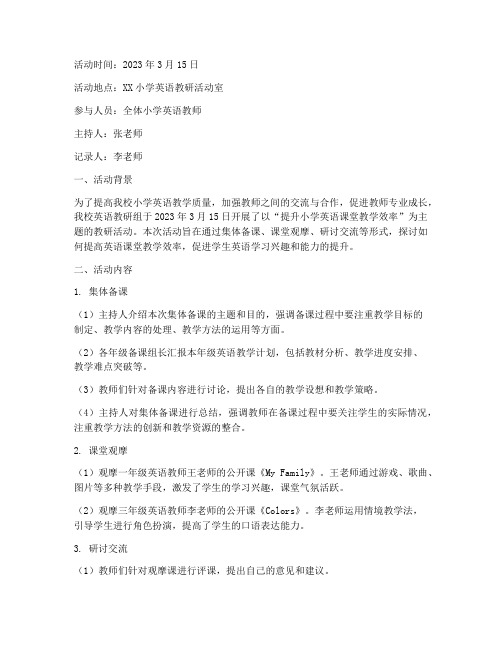
活动时间:2023年3月15日活动地点:XX小学英语教研活动室参与人员:全体小学英语教师主持人:张老师记录人:李老师一、活动背景为了提高我校小学英语教学质量,加强教师之间的交流与合作,促进教师专业成长,我校英语教研组于2023年3月15日开展了以“提升小学英语课堂教学效率”为主题的教研活动。
本次活动旨在通过集体备课、课堂观摩、研讨交流等形式,探讨如何提高英语课堂教学效率,促进学生英语学习兴趣和能力的提升。
二、活动内容1. 集体备课(1)主持人介绍本次集体备课的主题和目的,强调备课过程中要注重教学目标的制定、教学内容的处理、教学方法的运用等方面。
(2)各年级备课组长汇报本年级英语教学计划,包括教材分析、教学进度安排、教学难点突破等。
(3)教师们针对备课内容进行讨论,提出各自的教学设想和教学策略。
(4)主持人对集体备课进行总结,强调教师在备课过程中要关注学生的实际情况,注重教学方法的创新和教学资源的整合。
2. 课堂观摩(1)观摩一年级英语教师王老师的公开课《My Family》。
王老师通过游戏、歌曲、图片等多种教学手段,激发了学生的学习兴趣,课堂气氛活跃。
(2)观摩三年级英语教师李老师的公开课《Colors》。
李老师运用情境教学法,引导学生进行角色扮演,提高了学生的口语表达能力。
3. 研讨交流(1)教师们针对观摩课进行评课,提出自己的意见和建议。
(2)主持人组织教师们就如何提高英语课堂教学效率展开讨论,分享各自的教学经验。
(3)教师们就以下问题进行深入探讨:①如何激发学生的学习兴趣?②如何有效开展英语课堂活动?③如何提高学生的英语听说能力?④如何结合教材特点,创新教学方法?三、活动总结1. 通过本次教研活动,教师们对小学英语课堂教学有了更深入的认识,明确了提高教学效率的重要性。
2. 教师们在备课、课堂观摩和研讨交流过程中,相互学习、取长补短,提高了自身的教学水平。
3. 教师们纷纷表示,在今后的教学工作中,将努力提高英语课堂教学效率,为学生的英语学习创造更好的条件。
英语课外活动小组活动记录 共15周
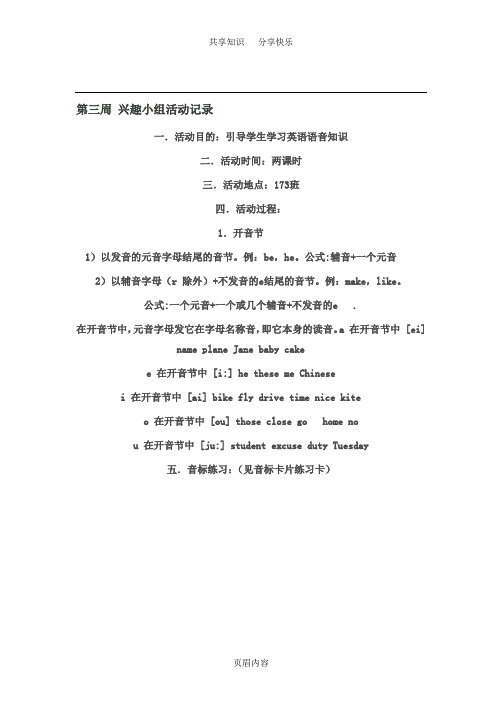
第三周兴趣小组活动记录一.活动目的:引导学生学习英语语音知识二.活动时间:两课时三.活动地点:173班四.活动过程:1.开音节1)以发音的元音字母结尾的音节。
例:be,he。
公式:辅音+一个元音2)以辅音字母(r 除外)+不发音的e结尾的音节。
例:make,like。
公式:一个元音+一个或几个辅音+不发音的e .在开音节中,元音字母发它在字母名称音,即它本身的读音。
a 在开音节中 [ei]name plane Jane baby cakee在开音节中 [i:] he these me Chinesei在开音节中 [ai] bike fly drive time nice kiteo在开音节中 [ou] those close go home nou在开音节中 [ju:] student excuse duty Tuesday五.音标练习:(见音标卡片练习卡)第四周兴趣小组活动记录一.活动目的:引导学生继续学习英语语音知识二.活动时间:两课时三.活动地点:173班四.活动过程:闭音节:以一个或几个辅音字母(r 除外)结尾而中间只有一个元音字母的音节,称为闭音节。
在闭音节中,元音字母读它所规定的短音在闭音节中 Aa [æ] bag dad hat map black back在闭音节中Ee [e] bed let pen desk yes egg在闭音节中Ii [i] fish big drink sit milk swim在闭音节中Oo [ ] clock not box shop sock在闭音节中Uu [∧] bus cup jump much lunch五.音标练习:(见音标卡片练习卡)第五周兴趣小组活动记录一.活动目的:学习英语音素(单元音和双元音)二.活动时间:两课时三.活动地点:173班四.活动过程:音标1、热身:唱26个英语字母唱2、学习单元音3、学习双元音4、学习辅音音标,并结合单词,学习拼读。
英语沙龙-社团活动记录

英语口语交际社团活动方案(记录表)社团名称:英语口语交际日期: 2014 年 10月11 日
英语口语交际社团活动方案(记录表)社团名称:英语口语交际日期: 2014 年 11月 11日
英语口语交际社团活动方案(记录表)社团名称:英语口语交际日期: 2014 年 12月 18日
英语口语交际社团活动方案(记录表)社团名称:英语口语交际日期: 2015 年 1月10日
社团名称:英语口语交际日期: 2015 年 3月 1日
社团名称:英语口语交际日期: 2015 年4月 5日
社团名称:英语口语交际日期: 2015年5月 4日
社团名称:英语口语交际日期: 2015 年 5月 20日
英语口语交际社团活动方案(记录表)社团名称:英语口语交际日期: 2015 年 6月 11日
英语口语交际社团活动方案(记录表)社团名称:英语口语交际日期: 2014 年 10月 11日
英语口语交际社团活动方案(记录表)社团名称:英语口语交际日期: 2014 年 10月 11日
英语口语交际社团活动方案(记录表)社团名称:英语口语交际日期: 2014 年 10月 11日
英语口语交际社团活动方案(记录表)社团名称:英语口语交际日期: 2014 年 10月 11日
英语口语交际社团活动方案(记录表)社团名称:英语口语交际日期: 2014 年 10月 11日
英语口语交际社团活动方案(记录表)社团名称:英语口语交际日期: 2014 年 10月 11日
英语口语交际社团活动方案(记录表)
社团名称:英语口语交际日期: 2014 年 10月 11日。
英语兴趣小组活动记录表

周次
1
时间
20XX.10.15
课外活课
活动地点
七(13)班教室
活动人数
20
辅导教师
XX
活动内容
Introduce yourself
活
动
过
程
记
录
自我介绍(I’m.../ My name is...)
1.提前进教室与学生交流+自我介绍+告诉学生接下来定自我调节让每位学生满意+学习小组分组+介绍今后学习规则.
(2)要求同学向大家介绍自己的名字。
(3)老师给学生取英文名。
(4)让学生用英文名介绍自己。
5.家庭作业
让学生回家向父母介绍自己的英文名。
6.告诉学生接下来定自我调节让每位学生满意。
活动
效果
因为是开团第一节课,学生和老师,以及学生之间都比较陌生,开始时思维不够发散,慢慢效果很好。
英语兴趣小组活动记录表
活动
效果
通过本次活动学生对英文歌曲有了近一步的认识,主要练习单词的发音,为口语考试做好准备,活动效果明显。
英语兴趣小组活动记录表
周次
8
活动时间
课外活课
活动地点
多媒体室
活动人数
20
辅导教师
活动内容
狐狸与乌鸦的故事
活
动
过
程
记
录
1.问候并介绍这节课的内容
2.展示中文故事视频
3.用英语简述这个故事,并教授故事里面的新单词及重要的词组
活动
效果
在课堂教学中通过游戏的方式向学生传授新的知识,或复习巩固以前所学,都能极大地调动学生的主动性和积极性,启发学生英语思维的能力,开发智力,激发求知欲,从而达到语言教学的目的。恰当的运用游戏进行英语教学,能有效地激发学生学习英语的兴趣,使学生在学中玩,玩中学,提高课堂教学效果。
幼儿园英语角活动记录

幼儿园英语角活动记录幼儿园英语角活动记录为了促进幼儿英语口语表达能力的提升和增强对英语的兴趣,我们在幼儿园开展了英语角活动。
以下是我对活动的详细记录:时间:每周三 9:00-10:00地点:幼儿园大厅参与人员:3-6岁幼儿,英语教师,班主任活动内容:1. 唱歌每次活动开始,我们都会先唱英语歌曲。
我们会放一些英文童谣和儿歌,例如Twinkle Twinkle Little Star,Rain Rain Go Away等等,同时伴随着手势和动作,让孩子们在享受音乐的同时,学会用英语歌唱。
2. 手工制作在上一堂课的基础上,我们会教孩子们制作一些与主题相关的手工制作,例如制作海报、贺卡、折纸等等。
这些活动可以让孩子们在玩耍中学习英语的知识,并且锻炼他们的创造性思维。
3. 英语游戏在活动的后半部分,我们会设计一些英语游戏,例如口语连连看、拼音打印、英文趣味问答等等。
通过这样的游戏,孩子们不仅能够巩固各种单词的拼写和含义,而且还能增强他们的英语口语表达能力,同时也有助于培养他们团队精神和竞争意识。
4. 导师互动在所有活动中,我们都会让英语老师和班主任与孩子们互动。
通过和孩子们的交流,老师们能够更加了解孩子们的英语学习情况,也能够更好地引导他们学习。
评价:通过多次英语角活动的开展,我们发现孩子们的英语口语表达能力和自信心显著提升。
他们愿意与老师和同学用英语交流,将所学到的英语知识运用到日常生活中。
同时,这样的活动也激发了孩子们的兴趣,让他们在愉快的氛围中学习和进步。
未来计划:继续开展英语角活动,逐渐增加活动的难度和要求,让孩子们在学习英语知识的同时,也能够提高英语的听、说、读、写的能力。
我们还计划组织一些英语颁奖仪式,鼓励表现突出的孩子,并且让他们感受到良好的学习积极性和成就感。
小学英语社团活动记录表
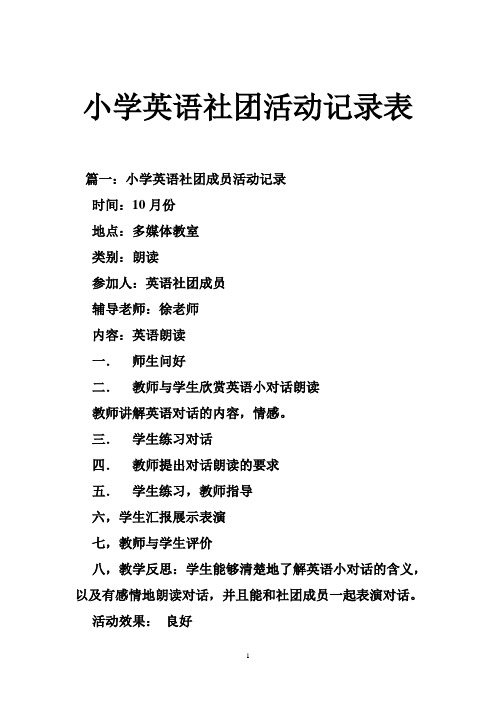
小学英语社团活动记录表篇一:小学英语社团成员活动记录时间:10月份地点:多媒体教室类别:朗读参加人:英语社团成员辅导老师:徐老师内容:英语朗读一.师生问好二.教师与学生欣赏英语小对话朗读教师讲解英语对话的内容,情感。
三.学生练习对话四.教师提出对话朗读的要求五.学生练习,教师指导六,学生汇报展示表演七,教师与学生评价八,教学反思:学生能够清楚地了解英语小对话的含义,以及有感情地朗读对话,并且能和社团成员一起表演对话。
活动效果:良好时间:11月份地点:多媒体教室类别:英语歌曲参加人:英语社团成员辅导老师:徐老师内容:学唱英文歌曲一.师生问好二.教师与学生欣赏英语歌曲视频教师解释英文歌曲含义,并带唱。
三.学生欣赏英语歌曲四.教师提出学习歌曲的要求五.学生练习,教师指导六,学生汇报展示七,教师与学生评价八,教学反思:通过这次社团活动,学生能对英文歌曲有个恰当的了解,能学唱简单的英文歌曲。
活动效果:良好时间:12月份地点:多媒体教室类别:英语剧表演参加人:英语社团成员辅导老师:徐老师活动内容:学习表演英语小短剧活动过程:开始部分:激发学生兴趣,观看英语剧表演的视频。
新授部分:学习剧本内容,熟悉句子的含义,并能流畅地说出句子。
(1)选定演员,发放剧本(2)熟悉剧本,练习句子(3)互相对演,记住动作和神态结束部分:1、学生展示表演的内容2、学生互相评价。
活动效果:良好篇二:英语社团活动记录英语社团活动记录活动时间2013.10.17.活动地点辅导教师参加人数活动内容记录一、激发培养学习兴趣柏拉图说:“兴趣是最好的老师。
”根据小学生好奇、好动、好胜的心理特征,挖掘教材中的有趣因素,以生动的画面、鲜艳的色彩、感人的音响等丰富的媒体表现形式,采用故事、游戏、歌曲、歌谣等方法,创造出一个引人入胜的情境,调动学生的积极性和主动性,充分激发学生的学习兴趣和欲望,帮助他们建立学习英语的成就感和自信心。
把知识的学习融入新颖别致娱乐形式中,发挥寓教于乐的学习优势,使枯燥的学习变得轻松愉快。
